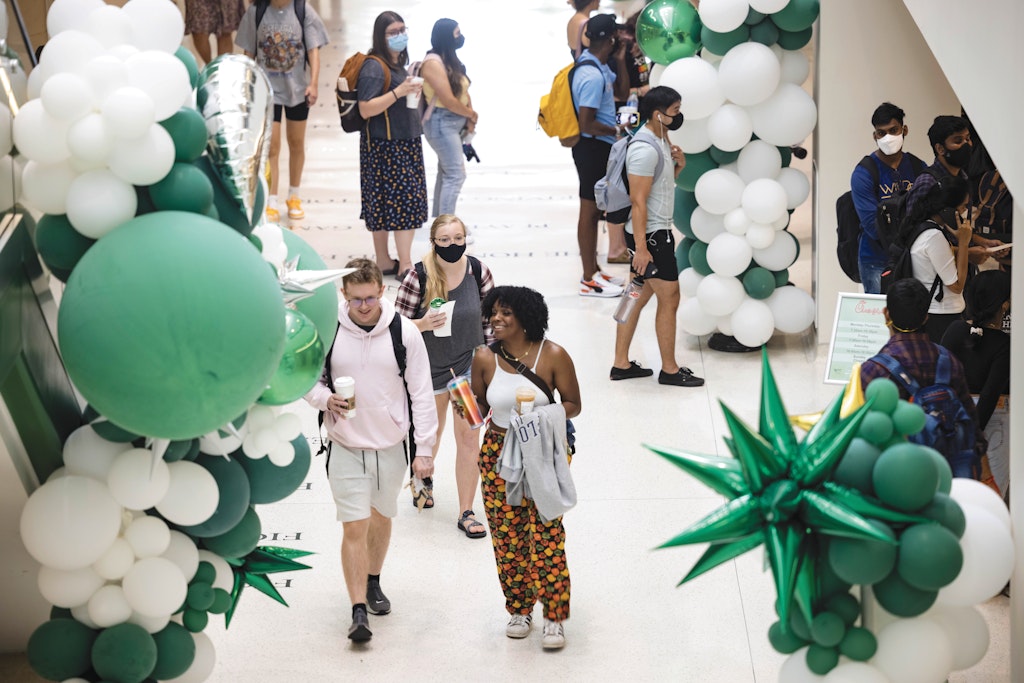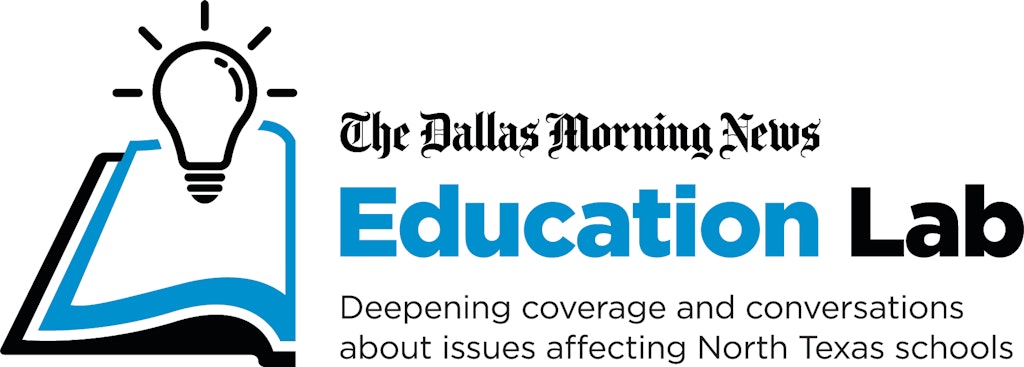
Campus life was booming once more at the University of North Texas as thousands of students moved from class to class during their first day back on Monday.
Students packed the University Union building, where they ate food, lined up for coffee and rested between classes. Many met up with friends and hung out in courtyards, some for the first time in nearly a year and a half.
“It’s crazy how you can go through 12 years of school and then just forget what it’s like to be around so many people again,” said Tabitha Lane, a junior majoring in philosophy at UNT.
Colleges and universities across Texas are returning to campus this week after the pandemic pushed many schools to rely on remote offerings since March 2020. But now, with the spike in COVID-19 cases in the state, things are getting confusing for many.
Lane, 20, and her friends still feel anxious on campus because, while most other students in her classes wore a mask, some didn’t.
Guidance is volatile as plans are getting upturned with the surge due to the more contagious delta variant.
UNT President Neal Smatresk said officials are urging students to wear masks and take precautions so operations aren’t disrupted again.
“We’re ready to do anything we have to do, we can pivot — we’ve shown that a year and a half ago — so if we have to go remote or use HyFlex classrooms or hybrid, we can do it,” he said. “We’d really not like to … the students came here because they want this experience.”
Now college students are wondering if they need to get tested for COVID-19 before setting foot on campus and what safety protocols are in place to keep them safe?
Here’s a look at how local college campuses are navigating the new school year.
Will masks be required?
It depends.
Schools that are currently requiring masks indoors include Arlington Baptist University, Dallas College, Southern Methodist University, Texas Christian University and Texas Wesleyan University. The University of Dallas is allowing faculty members to decide whether their students will be required to wear masks while in their own classes.
Schools like UNT and Texas Woman’s University are only strongly encouraging students to wear a mask indoors on campus.
As the Centers for Disease Control and Prevention updated its masking guidelines — recommending face coverings even for vaccinated people — local governments across the state are reconsidering having their own mandates. The moves defy an executive order that Gov. Greg Abbott issued in May.
The order prevents state schools — and nearly every other government entity in the state — from requiring face coverings, but private universities and schools are still able to do so.
Because local leaders and advocates are in an ongoing legal battle over the governor’s order, some universities have been going back and forth on their own masking requirements.
What other safety protocols are in place?
Most universities continue to require social distancing when possible, recommend people to constantly wash their hands as they move through the campus and will frequently clean “high-touch areas.”
Some schools are trying to limit capacity where they can. The University of Texas at Arlington and the University of North Texas at Dallas, for example, announced plans to rotate in-person attendance for classes to reduce the number of students in classrooms.
What if someone tests positive for COVID-19?
Students who test positive or come in contact with someone who did have to report it to the university through a form, quarantine at their home and transition into virtual learning, college leaders say.
Each university’s self-reporting form can be usually found on their websites under COVID-19 updates, which also notes instructions for when quarantine is necessary and for how long.
Will the COVID-19 vaccine be mandated?
No. Universities are not requiring students, faculty and staff to be vaccinated. While they are only encouraging people to get the vaccine, most universities have vaccination sites available on-campus.
Do I need to submit the results of a recent COVID test?
A few schools are requiring students, faculty and staff to participate in a mandatory testing period. They include Texas A&M University, the University of North Texas, UT-Arlington and the University of Texas at Dallas.
In most cases, students can opt out of the mandatory testing by providing proof of vaccination to their school.
Will testing be available to students and staff?
In some cases, schools have their own testing programs available only to their students or campus community. Most others are referring people to local testing sites.
Some schools, such as A&M, will not accept tests taken off campus.
Where can I find my district’s back-to-school plan?
You can find more details about back-to-school plans from ABU, Collin College, Dallas Baptist University, Dallas College, Paul Quinn College, SMU, A&M, TCU, Texas Tech University, Texas Wesleyan University, Texas Woman’s University, University of Dallas, UNT-Denton, UNT-Dallas, University of Texas at Austin, UT-Arlington, UT-Dallas and University of Texas at Tyler on their websites.
The DMN Education Lab is a community-funded journalism initiative, with support from The Beck Group, Bobby and Lottye Lyle, Communities Foundation of Texas, The Dallas Foundation, Dallas Regional Chamber, Deedie Rose, The Meadows Foundation, Solutions Journalism Network, Southern Methodist University and Todd A. Williams Family Foundation. The Dallas Morning News retains full editorial control of the Education Lab’s journalism.
Twitter: @ValeriaOliEsc
